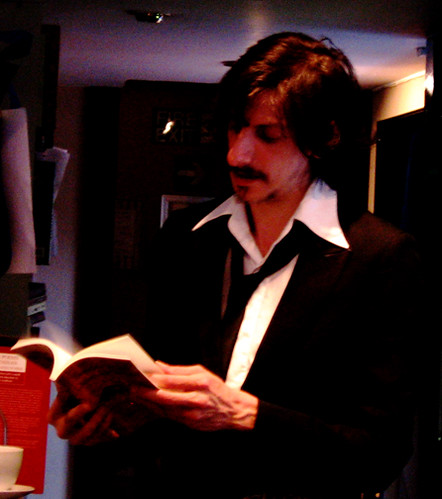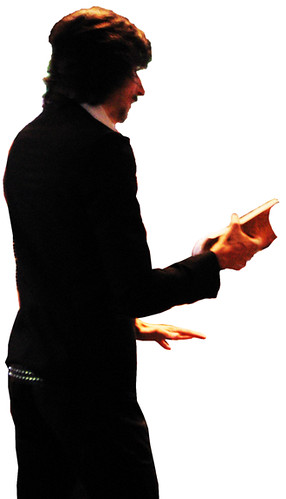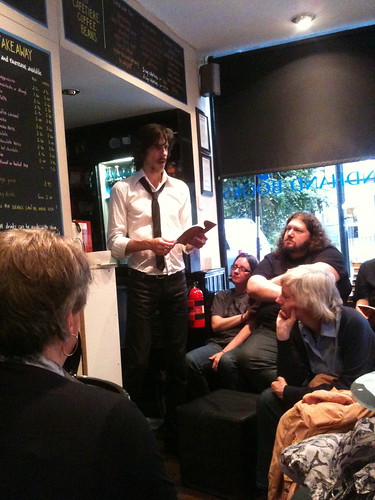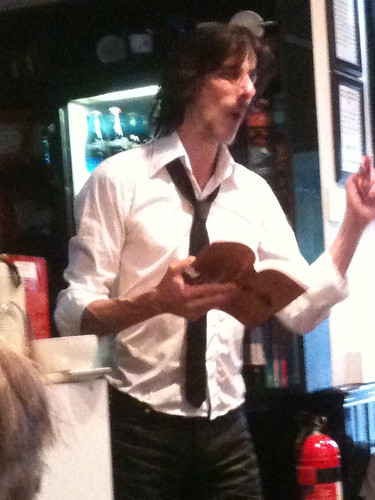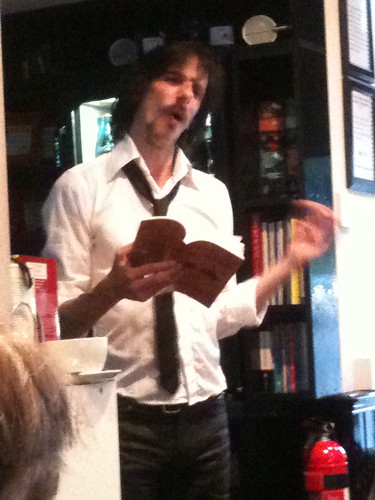Over at
The Mumpsimus, Matt Cheney links to
an article of his on the 25th anniversary of the movie, Stand By Me. He writes of how no film "had ever seemed more real to [him], more true, more beautiful," recalls listening to the soundtrack and his dad's old 45s from the same era, muses on how the death of River Phoenix now shades the ending, on the "naked artificiality" he appreciates now in a movie honest about its reconstruction of memory, this "world's largest ball of nostalgia".
All of which brings back memories for me -- weirdly similar, weirdly different -- and seems strangely timely as I'm elbow deep in a novella that's not a little inspired by works such as that film, fictions that sit, I'd say, in a modern pastoral idiom. I'd been thinking Ray Bradbury and Guy Davenport mainly, to be honest, aiming to expedite the botanical richness of Davenport that's such a crucial component of his idylls -- in "The Meadow," say -- that deliciation in the details, in the very terminology -- acuminate, glabrous, umbel, petiole -- to expedite this with a terraformed Mars of a Jack and Puck by way of Bradbury, dark and golden-eyed inhabitants of a new Arcadia, wired to a latter-day interwebs that allows even wastrel youths to relish the intricacies of nature without even really thinking about it, Linnaean description, Greek myth and cock knows what else at fingertips. It's utterly idealised and idealising, of course, but that's the nature of a pastoral idiom. Anyway, Cheney's article resonated with what's on my mind at the moment, reminded me of other taproots -- like the movie in question. And my own response to it.
The similarities? The differences? I can't remember when I first saw the movie. Most likely it was on video, I reckon, hired by my folks, so the protagonists on screen would have been a year or so younger than me by then. It certainly resonated; I've written elsewhere about the disappearance of a local kid when I was just a nipper, as has fellow Kilwinningite and rough age-ling Andrew O'Hagan. (It's the lynchpin of his book The Missing indeed.) In fiction, I've folded that in with summer explorations -- myself, my brother and our next door neighbour counterparts cycling out into the countryside; hell, in the shrouds of fuddled memory and fantasy, I can't tell you now if we actually talked of trying to find this missing kid, if I fancied at the time that we might, or if the potency of that story notion has just subsequently saturated my memory of childhood to the extent it feels we coulda, shoulda, woulda. It's entirely possible that myth was born wholly in the resonance of the movie
Stand By Me with the vaguest memories of my first encounter with... the absenting of life.
If you ever come across the phrase "Et in Arcadia ego" in my work, this is the root of it as much as Poussin's shepherds, by the way.
And in Arcadia I am. I also am in Arcadia. One of the curious differences, perhaps, between Cheney's response to the film and my own is that where he talks of deeply identifying with the movie when he was ten, I think the American Pastoral idiom made it another world for me even at the time. Even with the fictive story touching frames with facts of history -- that actual missing child out there in reality -- for all that I could identify with Wil Wheaton's Gordie on a theoretical level, there was this unattainable alterity to the movie for me. I don't think it was just me being older, recognising the nostalgia in it, that it was set in a past now gone and reconstructed. For sure, with
Back to the Future too, and all those Levis ads soundtracked with Ben E. King, Sam Cooke and Percy Sledge, I think I was at least a little savvy to the rose tint of the lenses, but what strikes me is the sense of spatial as much as temporal distance.
As a USian adult might yearn nostalgically for the unreachable storyfied
then of
Stand By Me -- and one might equally look to Bradbury's Dandelion Wine and Something Wicked This Way Comes where the temporal distance is more pronounced -- to a kid growing up in a Scottish New Town it was also achingly else
where, this Arcadian dreamscape, this other place where stories actually took place. I'm sure it's wryly amusing to many who actually grew up in the American sticks, but their Shitsville might well be a Scots kid's New York, San Francisco. It's not (or not just) the nostalgic fantasy of Smallville, I mean. Rather, as a kid living in any "nowhere" may look to any "somewhere" of a Big City as where stories take place, as Dick Whittington of Ohio might dream the East Village their London, (because the stories say, "This is where it happens, where you find love, win your fortune,") so those of us born outside the US in the era of Hollywood's cultural dominion may well see our environs as back-of-beyonds in which we're distanced even from the nostalgia.
Put it this way: Bradbury, master of nostalgia, turns the scent of sarsaparilla into a locus of Sehnsucht, of saudade. He conjures the soda fountains of a small town past out of root beer. But, well, I was talking about this with an American friend the other day, saying that here in the UK, see, we didn't really
have root beer. Where Bradbury is exploiting the sneakily soft susurrus of the word -- sarsaparilla -- springboarding from a flavour of childhood into fantasies of yesteryear, it's a curious thing for a reader to whom sarsaparilla is just a word. Less or more, I'm not really sure. But, an exotic unknown, for me such objects of desire as Bradbury taps were twice-removed, doubly unattainable. If the Sehnsucht, the saudade, he conjures is exquisite for a reader with rich childhood memories of root beer, it's an even more excruciating tease, perhaps, when you're being seduced into yearning for what you
could never have had.
That's what I think was the real crux of my response to
Stand By Me back when I first saw it. The very springboards of American Pastoral were pure myth from here; it might as well have been Virgilian eclogue. Oh, we have Dandelion & Burdock instead of dandelion wine, Irn Bru in place of root beer, there's plenty to tap into when one matures enough to look back on it all. It's just interesting, I think, that weird way in which from the outside the Sehnsucht invoked in American Pastoral becomes even more fully a yearning for yearning. I have a theory, see, that this is what Sehnsucht is as much as anything, not just a yearning for the past that was, not just a yearning for the past that could have been, but a yearning for the
desires of that past, the anticipations and appetences, wisting to be unsated again, to relish a particular way of hankering for the world. It's where I think it can -- and does in Davenport -- become more than just rose-tinted glasses, more than sighing melancholy, where it can become, if it goes that little step further, a reawakening of
enthusiasmos. Somewhere that's maybe
beyond Sehnsucht and saudade.
I have to admit, of course, no small part of my own yearning was doubtless bound up in a total crush on River Phoenix who, digging back through muddled memory, I
suspect I saw first in
Explorers and thought was captivating; who I
know I saw in
My Own Private Idaho in the cinema and thought was a veritable god among men, and please for the love of all that's good, let him be gay; but who I reckon really won my heart not even with the movie
Stand By Me itself but with that secret handshake thing he does with Wil Wheaton in the music video for the title track, that simple stroke of forearms a touch so intimately sensual... shit, they might as well have just kissed as far as I was concerned. Oh, aye, I well remember the pangs of longing
that daggered me with.
There are other yearnings too threaded through that weavework of the idyllic and the elegaic, a very personal resonance in that penultimate scene of Phoenix's character fading into absence, in the facticity of the actor's own death, a kid brother left in the shadow of it. So it goes. The movie is far truer for me now, far more real, in some ways, than it was when I first saw it. There are few forms as artificed as the pastoral, one might argue, American or otherwise, but there's a part of me thinks it's nonetheless as accurate a rendering of life as one can get. Life is passion, desire, yearning, and death at the heart of it. It's a meadow and a tomb, a railroad track through a forest to a body. Et in Arcadia ego. Which sounds more melancholic than it's meant to be, so I should probably shut up and just go work on my own SF pastoral story, try and get the idea across there, a notion that's more about the deliciation than the melancholy.
The deli I live round the corner from now sells proper root beer, I might note, flavoured with sarsaparilla. It'll never be loaded with nostalgia for me, but, man, you know it comes from
Smilax regili, right? Of the Smilax genus, Smilax who was once a nymph pining away in her love of Krokus, transformed into bindweed in the forests outside Sparta? Not so very far from Arcadia, in other words.
Labels: unlabeled
























